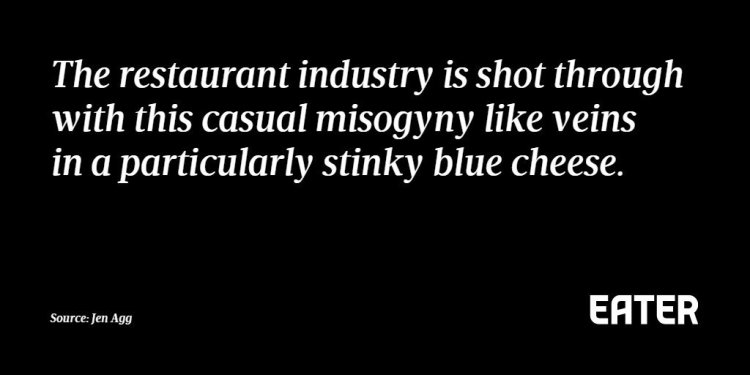If you’re one of my readers from Louisiana, you may already be aware of the John Besh scandal that came to light this past week. NOLA.com, the online version of The Times-Picayune, released details of an 8-month investigation on the disgusting sexism and sexual harassment culture fostered and encouraged by John Besh and Besh Restaurant Group.
To say that this is a big deal is an understatement. He’s not only well known in New Orleans and throughout Louisiana, he has gained national fame through his cookbooks, restaurants and national appearances.
Offenses committed by Besh and other managers/supervisors include sexual coercion, unwelcome touches to female employees, vulgar and offensive comments, and retaliation against reports of sexual harassment. Sadly enough, this type of behavior is not uncommon in the restaurant industry.
Outside of this particular organization, there are many women (and other gender-identifying people) who would easily be able to say #MeToo concerning their experiences in the restaurant industry.
Background on #MeToo

Ten years ago, activist Tarana Burke created the “Me Too” movement out of an experience she had as a youth worker that has never left her heart. Her story brings to light how difficult it can be to share trauma and be an advocate for someone reaching out for help. From this experience she created a movement so that women and especially women of color could know that they’re not alone in this world to deal with the pain and trauma of sexual harassment and assault.
In light of the recent Harvey Weinstein allegations (which are now under investigation), Alyssa Milano called for people in social media to bring awareness to the pervasiveness of sexual assault and harassment (mostly against women) by making a status stating #metoo, if they had ever experienced harassment or assault.
As you can imagine, the number of people saying #metoo were outstanding. Which brings me back to the restaurant industry.
The Restaurant Industry is Sexist
It is. According to a 2014 publication by the Restaurant Opportunities Center United (ROC United), the restaurant industry has the highest rate of sexual harassment of any industry (approximately 5 times higher than other industries). In addition to that, women who are chefs tend to be promoted less, earn less than their male peers, and are less respected by their subordinates.

To give you a clearer picture of the scope of the issue, I invite you to read these pieces about sexism, sexual harassment, and women in the restaurant industry:
How Can the Restaurant Industry Fix its Massive Sexual Harassment Problem?
An interview from 2014 with Teo Reyes, National Research Director at ROC United concerning the pervasiveness of sexual harassment within the restaurant industry and what restaurants can do in order to change the culture. The interview first identifies surprising results of the ROC United 2014 study (including sources of sexual harassment experienced by men), then goes into how the industry can reduce incidents of sexual harassment from customers, coworkers, and managers/owners.
Where are all the Great Female Chefs?
Considering the irony of the sexist phrase “women belong in the kitchen,” there are not many women in professional kitchen settings. The main reasons for this are sexism and the sexual harassment that make professional kitchens an unwelcome environment for women. There are many women challenging the alpha-male environment that seems to dominate kitchens and popular recognition, but we’ve got a long way to go.
I am a Restaurant Owner. Why Aren’t My Peers as Disgusted by Sexism as I Am?
Jen Agg, restaurateur and creator of the conference Kitchen Bitches: Smashing the Patriarchy One Plate at a Time, talks about the need for consumers and members within the restaurant industry to speak up about sexism in restaurants. She proudly goes to Twitter to shame companies that promote sexist cultures, and she encourages everyone else to as well. The message? If you don’t speak up, then nothing will change.
The Surprising Truth behind Sexism in the Kitchen
Chef Camille Becerra speaks about her experiences with sexism as a chef. Among them, interactions with other women who struggled with internalized sexism as a survival method in the kitchen. A line from the article regarding her experience with a male chef: “Just last year, when I was introduced to one of New York City’s leading chefs, a face that many have seen on Top Chef, he pointed at me, giggled, and asked, “Really, you’re a chef?””
9 Appalling Stories of Everyday Sexism, As Told By Women in the Service Industry
This piece is a collection of stories from women in the service industry (bartenders, waitresses, hostesses, and managers), and the truly appalling things that are done to them around the country. I couldn’t get through this one without getting incredibly furious that they had to go through this, and that there are thousands more like them who go through the same thing daily.
And this is just the tip of the iceberg.
It shouldn’t take a scandal for us to start caring about people who work in a certain industry. John Besh stepped down from his position with his restaurant group after his dirty work came to light, but he’s not the only one out there.
We should all be actively working to combat all of the -isms that make the world a dangerous place for so many.
There are too many people who must say #MeToo.

